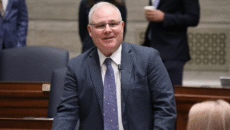JEFFERSON CITY, Mo. — While the economy in the Show-Me State is moving in a positive direction, the budget is still in a precarious situation, according to a report released by the State Auditor.
Tax incentives and tax cuts to individual and corporations coupled with increases in mandatory spending has left Missouri with an unstable budget — with a shortfall — that is not adequately prepared for an economic downtown.
“When the legislature passed new tax policies in recent years, taxpayers were promised economic growth that would lead to more investment in critical services and programs,” State Auditor Nicole Galloway said. She said those promises have not been fulfilled.
“We can not grow our way out of a budget hole,” Galloway said. “It’s just not possible.”
An analogy used was that Missouri would need to see its largest increase in jobs in state history to generate $500 million in revenue. To generate that revenue, Missouri would need to add approximately 168,000 new jobs — in September 2017, there were 116,000 unemployed workers in the state’s workforce — paying the state’s average wage. It took seven years to add that many jobs during a recent period of record growth.
The report found that, despite record low unemployment and policies aimed at attracting businesses, Missouri has not experienced the same level of economic growth as other states in the nation in recent years.
“Today more than ever, individual taxpayers are left footing the bill for government,” Galloway said. “Policymakers in Jefferson City talk a lot about lowering the tax burden on Missouri families. The reality is a family of four is paying higher property tax rates to support their kids’ schools, shelling out higher sales taxes on their newborn’s diapers, and having more difficult conversations around the dinner table about how to pay for their teenager’s college tuition.”
Fifty-three percent of the state’s budget was derived from individual incomes taxes in 2003. In 2017, 65 percent of the budget was funded from individual income taxes.
“More and more the burden of funding government is on the back of working Missourians,” Galloway said.
The shift is partially due to tax cuts for corporations. According to the report, when adjusted for inflation, corporate income taxes generated about $91 million less revenue for the state in 2017 than in 2003.
There is a correlation between a tax decrease and economic growth, Galloway recognizes, but not enough to offset the impacts to the budget. For example, 0.1 percent decrease in individual tax rates passed by the legislature in 2014 would generate a small uptick in economic activity, but cannot offset the loss in revenue due to numerous giveaways, incentives and exemptions in the current tax code, according to the report.
“We are starting to walk the bridge to Kansas,” Galloway said. “They have seen serious cuts in their budget because their promises, economic promises, were not fulfilled. We are not there yet but we are walking towards that bridge.”
According to the report, Missouri does not have enough money in the state’s “rainy day fund” to handle a recession or an increase in unemployment.
Missouri’s Budget Reserve Fund should have approximately $900 million to be considered ‘somewhat prepared’ for a moderate recession, according to Moody Analytics. As of June 30, the balance was $591 million.
The BRF has been increasingly relied upon to fund normal operations. During the recession in fiscal year 2008, the BRF balance never dropped below $400 million. In fiscal year 2017, the fund balance was below $200 million for six months and reached a low balance of $100 million.
This would create an issue particularly if there are employment decreased in the state.
The report found the budget cannot withstand increases in unemployment. If unemployment in Missouri reached the same rate as it did in 2009, during the recession, the state would experience an estimated $600 million revenue reduction. Due to the state’s current reliance on borrowing, reserve funds might not be readily available to fill the budget hole.
“Budgeting requires the courage of common sense,” Galloway said. “The legislature and the Governor need to be honest with Missourians on how decisions in Jefferson City affect citizens’ daily lives.”
The full report can be found here.













